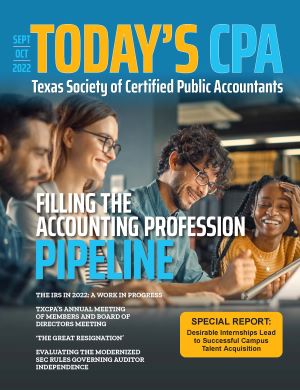The Great Resignation
Tips on Stemming the Tide of Employee Resignations
By Sharon Lukich, CPA
Where did everyone go? “The Great Resignation,” “The Big Quit,” whatever you want to call it, everyone has experienced it. All through 2021 and 2022, Americans have been quitting their jobs at an unprecedented rate.
According to the U.S. Bureau of Labor Statistics (BLS), an estimated 4.3 million people, 3% of all workers, quit their jobs in December 2021. From high-level executives to mid-level managers to entry level grads, “The Big Quit” has spared no one.
What’s the result? A surge in hiring. Businesses need to become proactive, if they haven’t already, in the area of their most important asset: their people.
So why are people quitting by the millions? Research shows that:
66% of employees who are looking for jobs outside of their organization say they’re looking for better opportunities.
54% of workers feel current employers don’t take their aspirations into account enough.
43% of workers say they’re simply burned out.
74% of highly skilled workers feel there are better or more opportunities elsewhere.
What this research shows is that the “quit” is not just ONE thing. It’s certainly not just about the desire for flexibility to work from home. The studies show that it’s a combination of things. During the shutdown, we all had to deal with things that were different and we had to adapt with little to no warning. As a result, things have changed and they have changed forever.
Parents with young children suddenly had little to no childcare options available, but were expected to continue to perform at work. Many were working on their laptops at a make-shift desk consisting of an empty Amazon box propped up on the ironing board. Internet connections were spotty and Zoom was clunky. To make matters worse, professionals with young children suddenly had to juggle their own work while keeping their children focused and on-task with their schoolwork. Young professionals with no children to manage were suddenly stuck inside with little to no socialization with their peers.
It’s no wonder that many people began to be reflective and consider their situations and what was and was not important to them. As a result, professionals have retired or started their own businesses and many two-parent households made a conscious decision for one of them to quit their job and stay home with the kids.
However, there are things that firms and companies can do to stem the tide of the Great Resignation.
1. Start off on the right foot.
Part of keeping people is a great on-boarding experience and that starts on day 1. It doesn’t have to come with gobs of company swag, but with intention and demonstrated readiness. Is their computer ready? Do they have access to all of the systems they need to do their job? Does their team know they are coming and know a little bit about them?
Hopefully, some of the members of the team were involved in the interview process and if so, they will be vested in seeing the new employee succeed. Next would be a check-up meeting at the 30-day and 60-day mark – how are things going?
2. Really listen to your employees.
Everyone says this, but what can you really do about it? How about considering implementing a stay interview versus an exit interview – why wait until an employee leaves and it’s too late? A stay interview should be conducted by an employee’s supervisor and include a variety of questions. Ideally, the first stay interview would be conducted around the 90-day mark.
A stay interview should include a variety of questions. What do you look forward to each day when you come to work? What are you learning here and what do you want to learn? Why do you stay here? Have you ever thought about leaving and what prompted it? What can I do to make your job better?
3. Career pathing.
Employees want to know how they fit into the plans of the organization and how their aspirations align with where it is headed. Quarterly “state of the organization” meetings where past results and future goals are communicated keep employees informed and involved. When employers don’t share results and future plans, employees are left to make assumptions on their own and we all know what we get when we assume.
4. Leadership training.
Whether it’s for current managers or future leaders, leadership training is critical. We all took classes in accounting, financial statements and tax in college, but how many classes did we take that taught us how to lead and inspire people? Just
because we are good auditors, tax professionals and corporate professionals, for example, doesn’t necessarily make us good leaders. Investing in leadership training for your employees is good for the organization, the employee and the business.
It can be a challenge to shift your mindset and resources to investing in your employees in ways you haven’t in the past. However, the employee experience you create and the culture that you promote can lead to resignation or retention. The choice is yours.
About the Author: Sharon Lukich, CPA, has been with Thomas, Edwards Group since 2001. In addition to being a partner with the firm, she helps direct the firm’s business development efforts. She earned a BS in Accounting from the University of North Texas and is a licensed CPA in the state of Texas. She serves on the board of TXCPA and is the immediate past chair for TXCPA Dallas.
Sources:
https://data.bls.gov/timeseries/LNS14000000
https://www.newsweek.com/how-stop-great-resignation-5-tips-higher-employee-retention-1677683






















